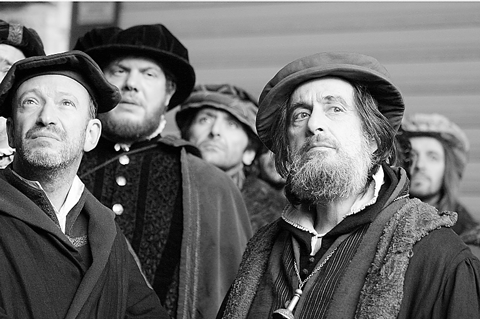By JERRY TALLMER
Screenwriter Michael Radford and his collaborator, Will Shakespeare
Left, Allan Corduner as Tubal and Right, Al Pacino as Shylock.
Signior Antonio, many a time and oft
In the Rialto you have rated me
About my moneys and my usances:
Still have I borne it with a patient shrug,
For sufferance is the badge of all our tribe.
You call me misbeliever, cut-throat dog,
And spit upon my Jewish gaberdine,
And all for use of that which is mine own.
Well then, it now appears you need my help . . .
Dustin Hoffman, on Broadway, did this (if memory serves) coldly, rationally, argumentatively. Boris Tumarin, Off-Off-Broadway several decades earlier, did it with icy intellectual disdain, hauteur, as if threading his way for survival through a mob of boorish, bullying, profligate, uneducated, murderous Yahoos.
Al Pacino does it with pain and flame — snarling, twisting, roaring flame.
“That’s really interesting — I just started to think I was finally old enough to play Shylock,” the 62-year-old Pacino had said when, at lunch, “Angels in America” (TV) producer Cary Brokaw threw on the table the idea of a movie of “The Merchant of Venice.”
The merchant of Venice is of course not Shylock, for Jews are not permitted to be merchants in 16th-century Venice. The merchant is Antonio, who seeks to borrow money — a lot of money, 3,000 ducats — on behalf of his needy young friend Bassanio, who is seeking the hand of the fair Portia. When Antonio’s merchant ships, laden with riches, come in to port, the debt to money-lender Shylock will be repaid. Meanwhile, there’s the small matter of a bond . . .
“There are two questions,” says Michael Radford, director of the hard, clean, uncluttered “Merchant of Venice” that, stunningly shot in Venice with Pacino as Shylock, Jeremy Irons as Antonio, Joseph Fiennes as Bassanio, and Lynn Collins as Portia, opens here December 29.
“One, does Shylock really think he’s gong to get his pound of flesh? Obviously not. In his heart of hearts, it’s just his way of saying: ‘[Expletive] you for spitting on me.’
“And the second question is: When Portia goes into that courtroom dressed as a lawyer, does she know how it’s going to turn out? Why does she drag out the whole business like that?
“It’s because she’s watching Bassanio and Antonio,” says Britain’s Radford, director previously of two beautiful films, “White Mischief” (1987) and “Il Postino” (1994).
The earlier Portia, the Portia of all that nonsense of the suitors and the caskets, is to some minds (mine) not much more than a spoiled, silly schoolgirl. But now —
“Portia grows through the trial. She realizes she’s married this shallow guy, Bassanio, who’s going to spend the rest of his life in bars and so forth.”
And not just in bars. In beds. Maybe in bed from time to time with none other than the Antonio, his savior, who’s so austerely played (as if with toothache of the soul) by the estimable Jeremy Irons. The film underwrites the probability of this with a quick, in-passing mouth-to-mouth kiss between the two men.
“I don’t think Bassanio was in love with Antonio,” said Michael Radford as he took a few minutes out from a clutch of television interviews during what the film world calls a “junket” here in New York a little while ago. “Antonio is in love with Bassanio.”
Antonio being the older of the two?
“Yes.”
That figures, the questioner remarked.
Radford, the India-born, Middle East-raised son of a British Army officer, gave a short laugh.
“If you don’t see a homosexual relationship between Antonio and Bassanio, you’ve got nothing for Portia to fight for,” he said.
The director who is also the screenwriter of this “Merchant of Venice” has been quoted as wryly saying he fashioned the script “with my collaborator William Shakespeare. He just contributed the dialogue, the plot, the story, and the characters, and I did all the rest.”
But now Radford said: “Well, I did a number of things. One of the most crucial was I looked at many Shakespeare movies.”
Did you like any?
“Not many. Even in the Orson Welles ‘Othello’ you don’t get to know Othello, you don’t get to feel for him.”
With Radford, and with Al Pacino, you do get to know Shylock, and you do get to feel for him, not only when he’s crushed by Portia’s verdict and sentence but even before that, when his daughter Jessica (Zuleika Robinson) runs off with her gentile boyfriend, Lorenzo (Charlie Cox) and her father’s ducats.
“Shylock is a man, who can tolerate any abuse because he can make his way through it. He’s most proud of his heritage. But when his daughter breaks the faith, it’s too much for him.
“That happens all the time in Britain,” said Radford. “While we were making this film, a man in Yorkshire, an Afghan, murdered his daughter for marrying a Christian. And he was heartbroken. Not a bad man. It was just that his world was torn apart.
“That’s what happens to Shylock. But what you cannot do is take the miseries of your race on your shoulders and go on a one-man mission of revenge.
“Anti-Semitism in Shakespeare’s time was a different sort of anti-Semitism than what the Russians and the Germans put everybody through in the 20th century.
“I don’t know where Shakespeare’s sympathies lie,” said Radford, “and I don’t care, because I’m making this film in the 20th century.
“Shakespeare wrote the most heartfelt of pleas for humanity and put them in the mouth of Shylock,
“Just last week in London, a man in the audience at a preview stood up and said: ‘I am a Muslim, and I totally identify with Shylock.’ That was music to me,” said Michael Radford. “Human psychology has not changed over the centuries.”
He points out that Shylock was Shakespeare’s “first great, flawed, doomed tragic hero. Hamlet, Othello, Lear, Macbeth, Antony all came later.”
He also points out that, contrary to the belief that Shakespeare never met or saw a Jew, he had in fact, as a spectator, after the defeat of the Spanish Armada, attended the trial, in London, for espionage and treason, of the Queen’s physician, a Portuguese Jew named Rodrigo Lopez, who was subsequently executed at Tyburn.
“A complete frame-up,” said Radford. “Shakespeare saw villainy heaped on Lopez because he was a Jew. It’s feasible that something happened, that he then sat down and wrote that speech, the one that sums up all humanity.”
Hath not a Jew eyes? Hath not a Jew hands, organs, dimensions, senses, affections, passions? Fed with the same food, hurt with the same weapons, subject to the same diseases, healed by the same means, warmed and cooled by the same winter and summer as a Christian is? If you prick us, do we not bleed? If you poison us, do we not die?
You should hear Al Pacino do it. As a matter of fact, you can.
WWW Downtown Express
































